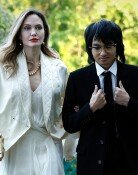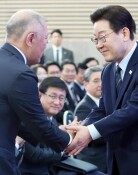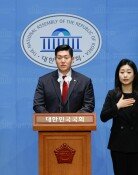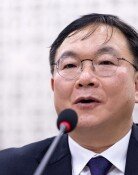Minister Emphasizes Ties With North
Minister Emphasizes Ties With North
Posted February. 01, 2006 03:04,
The hearing on the appointment of five state ministers, including 48-year-old Lee Jong-seok, the unification minister and National Security Council chief nominee, will proceed now that the ruling and the opposition parties have agreed to normalize the current session of the National Assembly.
Lees perspectives on North Korea and the Korea-U.S. alliance can be found in his numerous writings on the subject, including, North Korean Leadership and Armed Struggle Against Japanese Colonialism (1989); A Study on the Workers Party of Korea (1995); Unification Studies in the Era of Division (1998); North Korea-China Relations (2000); and A New Understanding of Modern North Korea (2000).
Kim Il Sung Was the Greatest Leader Among Anti-Japanese Communists-
We need to refrain from making demeaning remarks about North Korea, Lee said in his book, Unification Studies in the Era of Division. The Roh Moo-hyun administration seems to share those sentiments as shown by its decision to abstain from a recent vote by the United Nations North Korean Human Rights Committee, following in the footsteps of the former Kim Dae-jung administration.
In the same book, Lee said, We need to implement a policy which enhances the status of figures and institutions possessing a positive perspective toward opening up North Korea and improving inter-Korean relations. He argues that the South Korean government should implement a bold policy of economic cooperation and investment with the North. To this end, Lee drafted a Crucial Proposal on North Korea last May, which includes a plan to send two million kilowatts of electricity to the North.
In an attempt to reduce the academic controversies over the myths surrounding Kim Il Sung, Lee wrote, Kim Il Sung was the greatest leader among the communists engaged in armed struggle against Japanese colonialism around Dongman, in his book, North Korean Leadership and Armed Struggle against Japanese Colonialism.
In an article he wrote for a newspaper published by Sungkyunkwan University when he was pursuing his doctorate there in March 1990, Lee said, The first element for unification is establishing self-reliance, which opposes interference from foreign forces and respects equality, arguing, It is a non-persuasive excuse to say that keeping U.S. forces in Korea is necessary to prepare for possible aggression from the North.
However, Lee recognizes that North Korea is a military threat, defining the communist country as a hostile brother.
Korea-U.S. Alliance: Inevitable Conflicts?-
Lee believes that there are inevitable differences of perspective and conflicts between Korea and the U.S. because Korea deals with North Korea as a national issue, while the U.S. sees North Korea as an international one. In the same vein, he thinks that a change in the Korea-U.S. alliance is unavoidable.
In his book, Unification Studies in the Era of Division, he says, In the post-Cold War world, the U.S. is not in a position to maintain the unilateral (Korea-U.S.) alliance it did in the past, adding, With a system superior to North Koreas, and after establishing friendly relations with China and Russia, it is hard for South Korea to be obsessed with the Korea-U.S. alliance.
Reportedly, Lee, who was then the deputy head of the National Security Council, was deeply involved in the governments request last April that the U.S. stop its implementation of Operation Plan 5029, a contingency plan against North Korea, and the official proposal in last September to handover wartime operational control to Korea in a crisis.
Based on this perspective, Lee believes that the way to enhance national interest is a policy of self-reliant diplomacy that is not entirely reliant on the U.S. Regarding national security issues, he argues that their foundation should be based on fundamentally improving inter-Korean and North Korea-U.S. relations, rather than increasing the Souths military strength.
Kim Tae-woo, director of the Korea Institute for Defense Analyses, is less optimistic about Lees predictions, however. They lack an objective understanding of current security realities, he says.
Myoung-Gun Lee taewon_ha@donga.com gun43@donga.com







